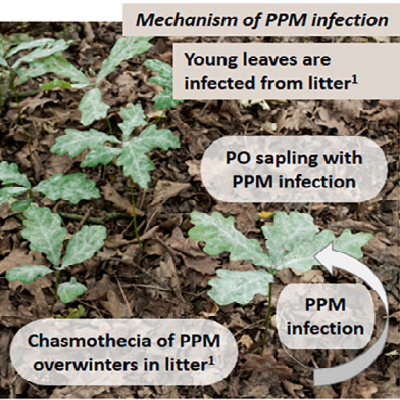Highlights
• Ecologists and conservationists often overlook the impacts of alien microorganisms.
• An alien microfungus impedes natural regeneration dynamics of a keystone species.
• Oak powdery mildew reduces shade tolerance and growth in seedlings and saplings.
• Proposed hypothesis explains the failure of natural regeneration of pedunculate oak.
• The alien microfungus threatens the rich biodiversity associated with oaks in Europe.
Abstract
Introduced pathogen microorganisms are important drivers of ecosystem change. This paper highlights the impact of the non-native pathogen mildew multi-species complex on the natural regeneration dynamics of pedunculate oak (Quercus robur). Pedunculate oak is a European keystone tree species, hosting a great amount of biodiversity, but its future role in (near-)natural forests is uncertain due to the lack of natural regeneration. We reviewed historical and recent ecological, pathological and forestry literature on topics related to the impact of mildew on the success of advanced natural regeneration of pedunculate oak in (near-)natural forests. We propose a novel hypothesis, the ‘pathogen mildew hypothesis’, to explain the failure of natural regeneration of pedunculate oak. Mildew reduces shade tolerance and vertical growth in seedlings and saplings, so sapling vitality and competitiveness have diminished considerably since it was unintentionally introduced to Europe in the early 20th century. Due to mildew infection, pedunculate oak in many cases no longer regenerates well naturally under its own canopy. We found that forest ecologists and conservationists often overlook the impacts of this ‘recent’ driver, while the ‘closed-forest’ and ‘wood-pasture’ hypotheses do not adequately help the management of pedunculate oak regeneration. Nature conservation and forest management plans should thus also consider the impact of mildew in order to improve natural regeneration, promote close-to-nature management of pedunculate oak forests, and support associated diversity. More generally, nature conservation, forest ecology and close-to-nature forestry should pay greater attention to the impact of introduced non-native microorganisms on the dynamics of natural ecosystems.
